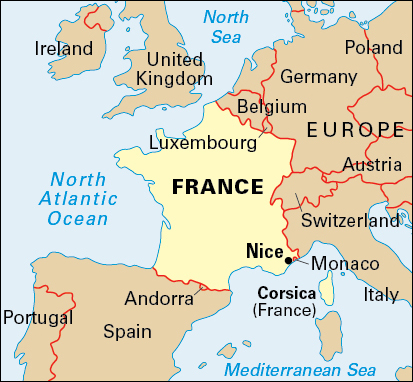Current Events Lesson Plan: July 7-20, 2016
Current Event: Bastille Day Terror in France
On July 14, a terrorist drove a truck into a large crowd in Nice, France, killing 84 people and injuring dozens of others. The brutal attack took place on the resort city’s famed Promenade des Anglais seafront as it was packed with people celebrating Bastille Day, France’s great national holiday. The driver, a Tunisian-French resident of Nice, rammed pedestrians at high speeds along the promenade with a large commercial truck. He continued his rampage—some witnesses claimed he shot a handgun from the cab as he drove—for about 1¼ miles (2 kilometers). The battered truck finally came to a halt, and the terrorist fired his weapon from behind the wheel. Police killed him in a quick shootout. While the Islamic State terrorist group (also known as ISIS, ISIL, or DAESH) has taken credit for the attack, a link between the driver and the terrorist group has not yet been established.
Objective:
France is one of the largest and most populous countries in Europe. About 65 million people live in the country. Paris, which is home to the Cathedral of Notre Dame, the Eiffel Tower, and the Louvre, is France’s capital and largest city. Bastille Day is the great national holiday of France, corresponding to Independence Day in the United States. On July 14, 1789, at the beginning of the French Revolution, a large crowd of Parisians captured the Bastille, a great fortress in Paris that stood as a symbol of royal tyranny. The Bastille’s capture symbolized the new spirit of freedom that swept through France and led to the establishment of a popular government. The Behind the Headlines news story and related World Book articles explore France and various French topics.
Words to know:
Discussion Topics:
1. France is one of the 49 independent countries in Europe. Ask your students how many of these countries they can name. (A list of all 49 countries can be found in the “Independent countries of Europe” table in World Book’s Europe article.)
2. Ask your students to name some famous French people. (Students might say Simone de Beauvoir, Charlemagne, René Descartes, Charles de Gaulle, Victor Hugo, Joan of Arc, Louis XIV, Louis XVI, Marie Antoinette, Molière, Claude Monet, Napoleon Bonaparte, Blaise Pascal, Pierre Renoir, Robespierre, Jean-Paul Sartre, Voltaire.)
3. Ask your students to debate: “Today, terrorism is the greatest threat to world security.”
4. Ask your students to use World Book’s Timelines feature to view or add to the History of France timeline. (Students may wish to use the “History” section of World Book’s “France” article for help.) Or, students can create a timeline of terrorist attacks. (Students may wish to use World Book’s Terrorism article for help.)



